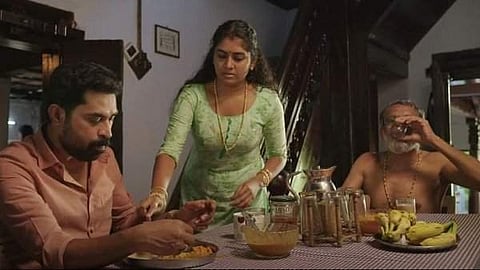

As a young girl, I often hung out with my mother in the kitchen. Whenever there was a gathering, the women always grouped in the kitchen while the men sat down in the drawing rooms, waiting to be served. Later, I was baffled to learn that most chefs at restaurants were men. Men are cooks at hotels, but rarely step into the kitchen at home? This paradox was an early thread I pulled at to understand patriarchy. The back-breaking labour women engage in has always been invisible—it’s almost like they are magic elves who disappear when the shoemaker comes. The Great Indian Kitchen (TGIK) takes off this invisibility cloak off women in the house.
TGIK unfolds mostly in the kitchen. And there’s a metronomic rhythm to the proceedings. Cut, chop, saute, whistle... Grind, pound, saute, boil. It’s the music of the film, of life. And it’s a rhythm that beats to the convenience of the man. The film has no names for its characters to signify that it could really be any household. So long as the men get what they want, the women don’t matter. If the husband doesn’t wish to order food from the outside, the wife must ensure she packs him food. Toothbrushes need to be handed, chutney needs to ground by hand, clothes need to be washed by hand because… tradition. Women are patient, because they are supposed to be. As the father-in-law in the film says, “the work women do is more important than what ministers do.” Why don’t the men do the honours then?
TGIK’s biggest success is that it establishes how blind men are to their privileges. They truly seem to believe it’s their birthright. When the man (a terrific Suraj Venjaramoodu) is expected to drink gomuthra, they can switch it for a bath in the local pond. The father-in-law believes it is okay for him to aimlessly scroll through his phone, while the women toil away in the background. In an excellent exchange, a guest mansplains the woman (Nimisha Sajayan) on how to make tea. And later, decides to cook dinner only to leave the kitchen in mess. Despite his flawed understanding, the man believes he is an expert on everything, even in tasks that women do every day. Again, the question is, if you know so much, why don’t you do it?
TGIK is destructively thorough in capturing and breaking down male privilege. The camera observes the women go about their chores. These are solid still frames with relatively lesser movement. It’s a terrific touch that the people in the house don’t really talk to each other. Conversations are mostly reduced to what needs to be done, like orders: ‘You can’t apply for a job, it won’t suit our family’ or ‘I’m fasting for Sabarimala, which means you need to sleep outside.’ TGIK also captures the fragility of the male ego. Anytime a woman punctures his ego, the man uses several techniques to get the woman to concede. When the wife (Nimisha) jokes about her husband following table etiquette at a restaurant but not at home, he says, “It is my house, I will do as I please.” This is among the problems of patriarchy—that it doesn’t acknowledge a woman’s agency at home though it commands that she stay in it. The husband even emotionally manipulates the wife into apologising. Even when he can’t give what his wife desires in bed, he doesn’t see that he has a problem. The issue is that the wife who ‘knows too much’. The father-in-law, on the other hand, uses a different technique. He deifies women for them to remain within patriarchy’s limits. If they are such deities, how is it that they have no say about their lives?
TGIK leaves no one out. It exposes an entire system and its functionaries, both men and women. It registers the presence of men who enjoy cooking and take it up as a responsibility in an organic moment. It also documents how women have processed patriarchy. Some have found ways to skirt the lines, like the domestic help who chooses to be silent about her menstruation so that she can earn. Some others have completely absorbed and normalised it. It acknowledges these women for being crucial in ensuring the legacy of patriarchy. One of my favourite moments in the films is when the wife walks out of the house and her marriage, and she crosses a gathering who are opposing the Sabarimala verdict, a gathering full of women! Director Jeo Baby makes so many accurate observations in the fine print.
Ever since The Great Indian Kitchen’s release on Neestream (Amazon, Netflix missed a gem here), I have seen my social media timelines flooded with posts that signify rage and anguish at status quo. One post read, “If a man watches this film without guilt, he has won!” But there are no revelations in this story; it’s simply one about the average kitchen. What the film does, importantly, is to remember to train the spotlight at the details that matter, like showing the toil of a woman. That is enough to get people raging over a routine that has existed right under our noses for decades, one that we have tolerated with discomfort I hope this film pushes all of us to look into our own backyards.